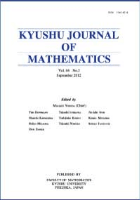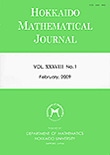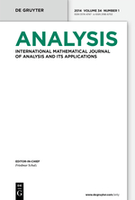
Computational Methods and Function Theory
Scope & Guideline
Fostering collaboration through rigorous mathematical exploration.
Introduction
Aims and Scopes
- Complex Analysis and Function Theory:
The journal emphasizes research in complex analysis, including the study of holomorphic functions, meromorphic functions, and their properties, focusing on aspects such as shared values, uniqueness, and normal families. - Differential Equations:
A significant portion of the journal's content revolves around the analysis of differential equations, particularly nonlinear differential equations, and their solutions, including both entire and meromorphic solutions. - Geometric Function Theory:
Research related to geometric properties of functions, including mappings, distortion, and conformal mappings, plays a critical role in the journal's scope. - Operator Theory:
The journal includes studies on various operators, particularly within the context of function spaces, such as composition operators, differential operators, and integral operators. - Applications of Function Theory:
Papers often explore applications of function theory to areas such as physics, engineering, and computational methods, highlighting the relevance of these mathematical concepts in practical scenarios.
Trending and Emerging
- Computational Techniques and Numerical Methods:
An increasing number of papers are focusing on computational methods, numerical simulations, and algorithmic approaches to solving problems in function theory, reflecting a trend towards practical applications. - Geometric Function Theory and Mapping Problems:
Research on geometric properties of functions, particularly in the context of quasiconformal mappings and geometric inequalities, is gaining traction, indicating a renewed interest in the interplay between geometry and analysis. - Operator Theory and Function Spaces:
There is a growing emphasis on the study of operators in various function spaces, including weighted spaces and their applications in both theoretical and practical contexts. - Advanced Differential Equations:
Emerging themes include the analysis of complex nonlinear differential equations and their applications, showcasing a trend towards sophisticated mathematical modeling. - Interdisciplinary Applications:
The journal is increasingly publishing work that applies complex analysis and function theory to interdisciplinary fields, including physics, engineering, and data science, highlighting the broad applicability of these mathematical concepts.
Declining or Waning
- Classical Function Theory:
There has been a noticeable decrease in papers focusing on classical aspects of function theory, such as basic properties of analytic functions, which may suggest a shift towards more applied or computational methodologies. - Real Analysis:
Topics traditionally associated with real analysis, particularly those that do not intersect with complex analysis, seem to be less represented in recent publications. - Elementary Techniques in Analysis:
The use of elementary techniques in analysis appears to be waning, with a growing preference for advanced, computational, or abstract approaches in function theory.
Similar Journals

Kyushu Journal of Mathematics
Exploring innovative methodologies in the world of mathematics.Kyushu Journal of Mathematics, published by Kyushu University, Faculty of Mathematics, is a notable peer-reviewed journal dedicated to advancing the field of mathematics since its inception in 1994. With a strong academic reputation and classified in the Q2 Quartile within the miscellaneous mathematics category as of 2023, this journal serves as a vital resource for researchers, professionals, and students alike. Although it does not currently offer open access, its rigorous editorial standards ensure the dissemination of high-quality research. The journal is indexed in Scopus, ranking within the 24th percentile among general mathematics publications. This esteemed journal encourages submissions that contribute to various mathematical disciplines, thereby fostering a robust scholarly dialogue within the mathematics community. Explore cutting-edge research and innovative methodologies by engaging with the Kyushu Journal of Mathematics.

Russian Mathematics
Unveiling Innovative Mathematical InsightsRussian Mathematics is an esteemed journal published by PLEIADES PUBLISHING INC, specializing in the field of mathematics. With its ISSN 1066-369X and E-ISSN 1934-810X, this journal serves as a vital platform for disseminating innovative research and advancements in various branches of mathematics. Established in 1992, it has earned its place in the Q2 category of the mathematics (miscellaneous) discipline, reflecting its growing influence and reputation within the academic community. Although it is not an open-access journal, its rigorous selection process ensures that only high-quality research is published, making it an invaluable resource for researchers, professionals, and students seeking in-depth insights into mathematical theories and applications. The journal has documented its evolution through a converged years format from 2010 to 2024, emphasizing its commitment to fostering scholarly discourse. With its address located at PLEIADES HOUSE, 7 W 54 ST, NEW YORK, NY 10019, UNITED STATES, Russian Mathematics is poised to contribute significantly to the global mathematical community.

Annales Fennici Mathematici
Pioneering Research in Contemporary MathematicsAnnales Fennici Mathematici is a prestigious academic journal published by Suomalainen Tiedeakatemia based in Helsinki, Finland. With an ISSN of 2737-0690 and an E-ISSN of 2737-114X, this journal has quickly established itself as an essential resource in the field of mathematics since its inception in 2021. It boasts an impressive Q1 categorization in Mathematics (miscellaneous) for 2023, highlighting its impact among top-tier mathematical publications. Currently, it holds a Scopus rank of #135 out of 399 in General Mathematics, placing it in the 66th percentile among its peers, ensuring visibility and relevance for its published works. The journal is committed to providing a platform for innovative research and the dissemination of mathematical discoveries, making it an invaluable resource for researchers, professionals, and students looking to expand their knowledge and engage with contemporary mathematical challenges.

Analysis Mathematica
Exploring the depths of analytical thought.Analysis Mathematica is a distinguished academic journal dedicated to the field of mathematics, focusing specifically on the varied aspects of analysis. Published by Springer International Publishing AG and based in Hungary, this journal has been an essential platform for scholarly communication since its inception in 1975. With a broad scope that encompasses theoretical developments and applications in mathematical analysis, it serves as a conduit for innovative research and discourse among mathematicians and researchers alike. While it currently holds a Q3 ranking in both Analysis and Miscellaneous Mathematics categories as of 2023, contributing authors are encouraged to elevate its impact through substantial contributions. Although not currently an open-access journal, Analysis Mathematica remains accessible through various academic databases, making it an invaluable resource for professionals, students, and researchers striving for excellence in mathematical analysis.

Analysis & PDE
Advancing the Frontiers of Analysis and PDE.Analysis & PDE is a premier journal dedicated to advancing the fields of analysis and partial differential equations, published by Mathematical Science Publications. With its ISSN 1948-206X, this journal has established itself as a critical platform for the dissemination of high-quality research since its inception in 2008. An indicator of its scholarly impact, it holds a prestigious Q1 ranking in the 2023 categories of Analysis, Applied Mathematics, and Numerical Analysis. The journal's esteemed standing is further underscored by its impressive Scopus rankings, including Rank #24 in Mathematics Analysis, placing it in the 87th percentile of its category. Aimed at researchers, professionals, and advanced students, Analysis & PDE provides a vital forum for innovative studies that push the boundaries of mathematics while fostering a deeper understanding of analytical methods and their applications across various real-world challenges. With no open access restrictions, it remains an accessible resource for the global research community. For more information, please reach out to the editorial office at the Department of Mathematics, University of California, Berkeley.

POTENTIAL ANALYSIS
Exploring the Depths of Mathematical PotentialPOTENTIAL ANALYSIS is a prestigious academic journal dedicated to the field of mathematical analysis, published by Springer. With the ISSN 0926-2601 and E-ISSN 1572-929X, this journal serves as a pivotal platform for scholars to disseminate cutting-edge research and advancements in potential theory, providing insights that bridge theoretical mathematics and applied analysis. Since its inception in 1992, POTENTIAL ANALYSIS has consistently maintained a high impact factor, boasting a Q1 rating in the 2023 category of Analysis, signifying its influence and reputation among its peers. It ranks 76 out of 193 in the Mathematics Analysis category in Scopus, placing it within the 60th percentile, which attests to the journal's commitment to quality and rigorous peer-review processes. While access to its articles is not open, it remains an essential resource for researchers, professionals, and students aiming to expand their understanding of potential theory and its applications in various fields. The journal's ongoing publication until 2024 promises a continual flow of innovative research, underpinning its role as an invaluable asset in the mathematical community.

Journal of Mathematical Analysis
Transforming Ideas into Mathematical SolutionsThe Journal of Mathematical Analysis, published by UNIV PRISHTINES in Serbia, offers a dedicated platform for the dissemination of innovative research in the fields of mathematical analysis and applied mathematics. With an ISSN of 2217-3412 and a convergence period from 2020 to 2024, this journal aims to foster significant advancements in both theoretical and practical aspects of mathematics. Categorized in the Q4 quartile for Analysis, Applied Mathematics, and miscellaneous Mathematics as of 2023, it serves as an essential resource for researchers and professionals alike, providing key insights into the evolving landscape of mathematical inquiry. Although it is an open access journal, facilitating global readership, its Scopus rankings reflect its emerging status, with rankings indicating a 51st percentile in Mathematics (miscellaneous) and 28th percentile in Applied Mathematics. This journal not only aims to contribute to academic discourse but also seeks to bridge gaps between mathematical theory and real-world applications, making it a vital resource for students and professionals engaged in the complexities of mathematical research.

COMMUNICATIONS ON PURE AND APPLIED ANALYSIS
Elevating the Standards of Mathematical ScholarshipCOMMUNICATIONS ON PURE AND APPLIED ANALYSIS, published by the American Institute of Mathematical Sciences (AIMS), is a pivotal journal that serves the fields of pure and applied mathematics. With an ISSN of 1534-0392 and an E-ISSN of 1553-5258, this journal showcases rigorous research findings that span a myriad of topics within mathematical analysis and its applications. Given its impressive Q2 ranking in both Analysis and Applied Mathematics categories, it is recognized for its significant contributions, ranking 92nd out of 193 in Analysis and 369th out of 635 in Applied Mathematics according to Scopus. The journal, running continuously from 2004 to 2024, invites submissions that push the boundaries of mathematical thought and practice. While it operates under a traditional access model, the journal's comprehensive scope and burgeoning impact factor underscore its importance for researchers, professionals, and students who seek to engage deeply with current mathematical advancements.

Hokkaido Mathematical Journal
Exploring the depths of mathematics for a brighter future.Hokkaido Mathematical Journal, published by Hokkaido University, Department of Mathematics, stands as a pivotal platform for scholarly discourse in the field of mathematics. Established in 1972, this peer-reviewed journal has consistently contributed to the advancement of mathematical research, covering a wide spectrum of topics within the discipline. With its current ranking in the third quartile (Q3) among miscellaneous mathematics journals, it offers valuable insights and findings that cater to both established researchers and budding mathematicians alike. The journal is accessible through traditional subscription, fostering a community that values rigorous theoretical exploration and applied mathematical methods. As it approaches its convergence year in 2024, Hokkaido Mathematical Journal remains essential for those dedicated to pushing the boundaries of mathematical knowledge and innovation in Japan and beyond.

Analysis-International Mathematical Journal of Analysis and its Applications
Transforming Theoretical Concepts into Practical SolutionsAnalysis - International Mathematical Journal of Analysis and its Applications, published by Walter de Gruyter GmbH, has been a pivotal resource in the fields of analysis and applied mathematics since its inception in 1981. This journal, with the ISSN 0174-4747 and E-ISSN 2196-6753, aims to bridge theoretical and practical applications of mathematical principles, catering to a global audience of researchers, professionals, and students. Operating from Berlin, Germany, it has established a reputation for publishing high-quality, peer-reviewed articles that contribute significantly to the understanding of analysis, numerical methods, and their applications in various scientific domains. While currently not an Open Access journal, it offers a wealth of knowledge to those invested in advancing mathematical theories and their real-world applications. The journal's presence in the Q3 quartile category across critical mathematical disciplines, as denoted by its Scopus rankings, reflects its commitment to scholarly excellence and relevance in a rapidly evolving field. With contributions expected to continue through 2024, Analysis remains an essential platform for advancing discourse and dissemination of innovative mathematical ideas.